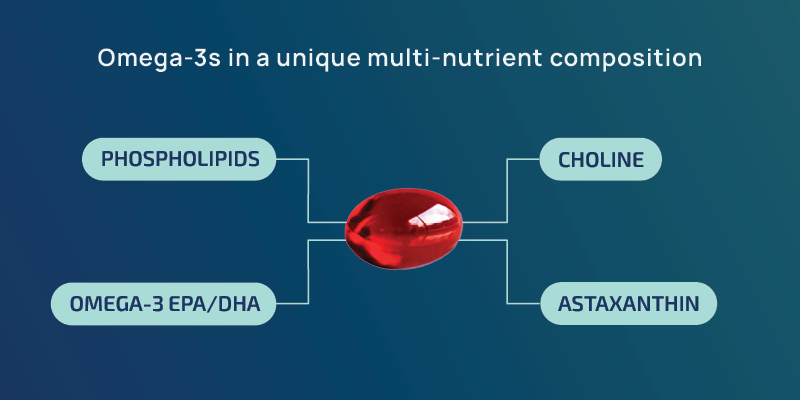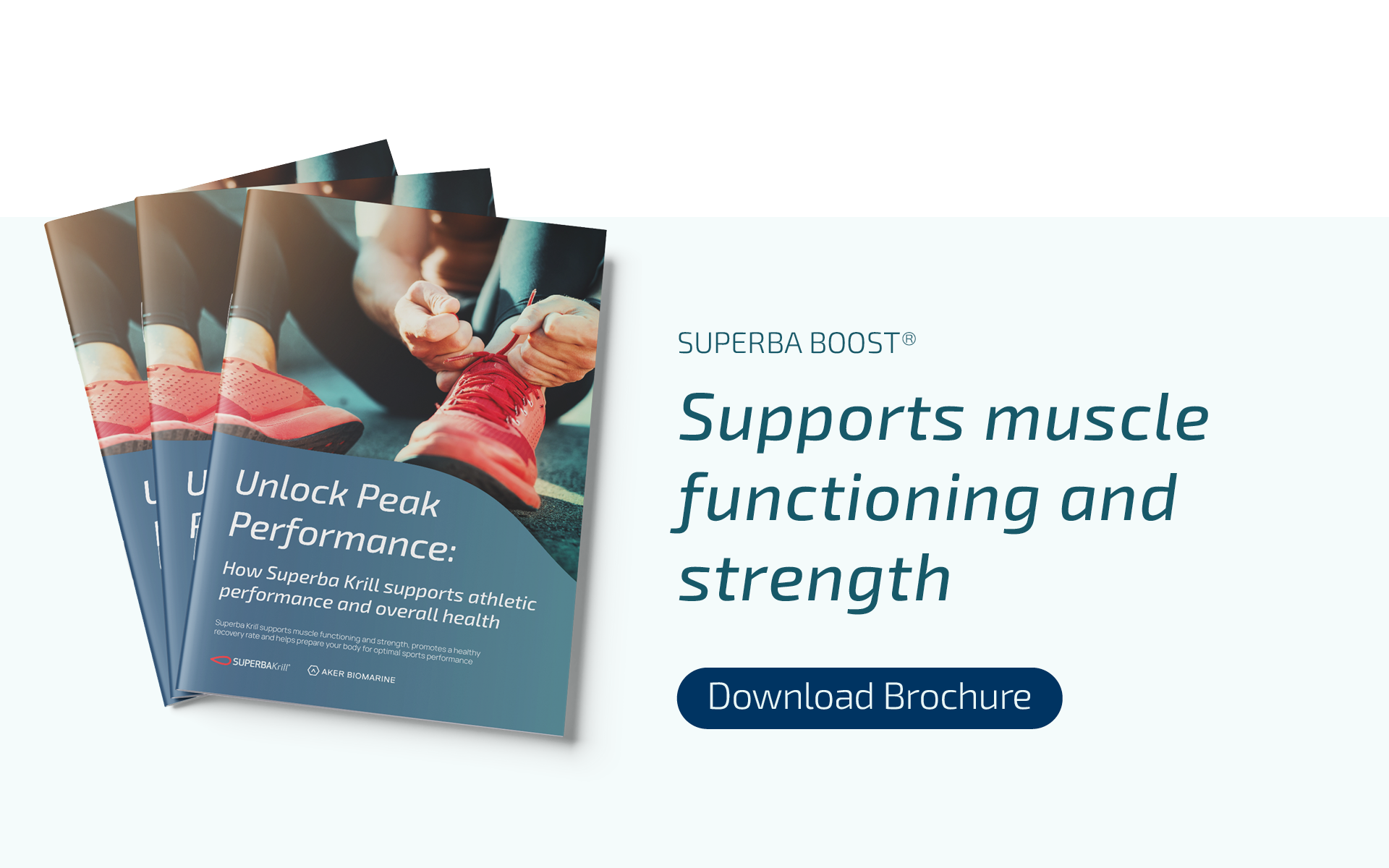For Dr. Ding, Aker BioMarine’s R&D Director, running wasn’t always about chasing big goals - it started to clear his mind during his PhD studies, a much-needed escape from the stress of academia. But like so many things in life, one small step led to another. First, he set out to complete a 10 km race. Then came a half marathon. And eventually, he dared to take on the full marathon distance. From Frankfurt in 2015 to qualifying for the Boston Marathon in 2025, Dr. Ding has turned his once stress busting hobby into a fulfilling passion.
But to compete at his best, it’s also about proper nutrition and long-term health. Dr. Ding attributes his long-term resilience and well-being to his training as well as his nutrition regimen and scientific background, specifically his work with krill oil, an ingredient shown to reduce inflammation, enhance cardiovascular function, and improve muscle recovery.
We had the opportunity to hear more about his incredible journey, nutritional hacks and much more!
What was your motivation to start running and how has it evolved?
Dr. Ding: Norway is a very sporty country, and I was influenced by the strong running culture in Bergen, where I lived before. I started running during my PhD studies to cope with stress. Running in the Norwegian mountains became my escape, allowing me to disconnect from work and immerse myself in nature. Initially, I just wanted to run for enjoyment. Then, I set small goals - running 10 km, then a half marathon, and eventually a marathon. Now, my focus is not just on completing races but on improving my times while staying injury-free.

Running for me is about both health benefits and personal achievement. Running helps me reduce mental stress, and I enjoy setting long-term goals and working towards them. The feeling of accomplishing a goal after months of dedication is very satisfying. In 2024, I ran 3,005 km with nearly 25,000 meters of elevation gain, participated in two marathons (London and Berlin), and set a personal best of 3h 2min in London with a negative split - an effort that ultimately secured my qualification for the Boston Marathon. This accomplishment represents years of refining my training, adjusting my approach, and learning how to train efficiently while minimizing injury risk.
Where do you find inspiration and what is your training philosophy?
Dr. Ding: I don’t have a specific athlete who inspires me, but I train with a local running club twice a week. The club consists of many great runners who encourage and motivate each other. Training together helps me push through tough sessions, even in Norway’s cold winters and stormy weather.
My philosophy is to take it slow and build gradually to run fast and long. Overtraining can lead to burnout or injuries, so I focus on long-term progress rather than short-term gains. Consistency is king, and my goal is to prioritize injury prevention while increasing my mileage year by year. Looking at my progression - 1,619 km in 2022, 2,012 km in 2023, and 3,005 km in 2024 - I see the power of gradual adaptation. Staying largely injury-free during this progression has reinforced my belief in the importance of proper training load management, nutrition, and recovery strategies.
Read more: Unlock optimal performance and overall health with Superba Krill
How has your experience as a scientist shaped your view of nutrition for sports?
Dr. Ding: Many products on the market claim to enhance athletic performance or to speed up recovery, but not all are backed by solid scientific evidence. As a scientist, I prioritize well-researched nutrition principles and avoid trends that lack rigorous studies. My approach to nutrition is simple yet effective: I focus on a clean, balanced diet while incorporating supplements with solid scientific results. Specifically, I take calcium and magnesium to support bone health and muscle function, vitamin D to maintain optimal energy and immune function, and SUPERBA Boost krill oil, which provides essential omega-3s and choline to help reduce inflammation and improve recovery.
Watch our webinar on trends shaping sports nutrition supplement brands here:
Just like food supplementation, training is not about instant results but about gradual and sustained improvement over time. However, I have noticed that I get injured less frequently compared to before, which could be due to my regular krill oil supplementation and my careful approach to training. Both running and proper nutrition work best when they become a long-term part of one's routine, contributing to overall resilience and performance.
What does a typical training week look like for you and what are your dietary habits?
Dr. Ding: My training typically consists of five running sessions and one to two strength workouts per week. I do two easy runs (around 10 km each), two lactate threshold interval sessions with my running club, and a long run on the weekend. Recently, I have incorporated strength training right after my threshold sessions, which has helped improve my performance and stay injury-free.
I don’t follow a strict diet, but I focus on maintaining a well-balanced intake of carbohydrates, healthy fats, vegetables, and high-quality proteins to support my training and recovery. I believe in fueling my body with nutritious foods while allowing occasional indulgences - because balance is key. I also rarely drink alcohol, as I find it affects my recovery and sleeping quality.
Eating sufficient carbohydrates is key. Science suggests that consuming a mix of protein and carbohydrates at the right times during and after workouts supports performance and recovery. Carbohydrates fuel endurance activities, while protein aids in muscle repair and synthesis. Studies show that a 3:1 or 4:1 carbohydrate-to-protein ratio post-exercise can optimize glycogen resynthesis and muscle recovery.
Additionally, omega-3 fatty acids, such as those found in fatty fish or krill oil, have been linked to reduced exercise-induced inflammation, which can aid in long-term recovery. I follow these scientific recommendations to ensure my nutrition supports both my immediate performance and long-term training adaptations.
How do you continuously improve on your journey?
Dr. Ding: Over time I have refined my training approach. Everyone has a different physiology, starting point and work/life schedule, so I had to experiment with different plans to find what works best for me. I have learned how to optimize my training without overloading my body. I follow structured training plans specifically tailored for marathon races. I enjoy using technology. I have a GPS watch, a Stryd footpod to measure my power output, and recovery boots for post-run muscle massage.
You take krill oil daily. Have you noticed any specific benefits in your performance?
Dr. Ding: Yes, I have seen improvements in my recovery. Recovery isn’t just about reducing fatigue—it also means lowering injury risk. My training volume has increased significantly over the years, yet I experience fewer injuries than before. Krill oil may be playing a role in this.
Omega-3, choline, and astaxanthin are highly beneficial and relevant for endurance sports. Studies show that choline plays a critical role in neuromuscular function, which are essential for endurance athletes. Omega-3s, particularly EPA and DHA, have been extensively researched for their anti-inflammatory properties, helping to reduce exercise-induced muscle soreness and improve heart rate variability. Astaxanthin, a powerful antioxidant, has been shown to mitigate oxidative stress caused by prolonged endurance activities, which can enhance recovery and muscle performance. Together, these factors contribute to better endurance, reduced recovery time, and overall athletic longevity.

Research consistently shows that regular exercise plays a crucial role in extending lifespan and enhancing quality of life. Studies have linked endurance and resistance training to better cardiovascular health, reduced risk of chronic diseases, such as diabetes and hypertension, and enhanced cognitive function as we age. Furthermore, engaging in consistent physical activity supports mental health by reducing stress, anxiety, and depression.

Do you have any final thoughts on the importance of sports nutrition?
Dr. Ding: Nutrition is a key factor in both performance and longevity. Research shows that endurance athletes require adequate macronutrient intake to maintain energy levels, as well as micronutrients such as iron, calcium, and vitamin D to support bone health and prevent deficiencies. Omega-3 fatty acids, particularly from krill oil, have been shown to reduce inflammation, enhance cardiovascular function, and improve muscle recovery. Ensuring a consistent and science-based nutritional approach not only enhances immediate performance but also helps sustain long-term health and resilience.


